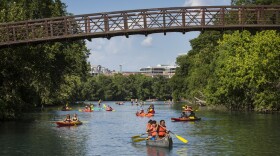This story was originally published on Oct. 4, 2018.
For the uninitiated, the Austin Aqua Festival was a big deal – and we’re not just talking about its reputation. It was a big, sprawling affair that, at different points in its history, had events from the Hill Country to what was then Bergstrom Air Force Base.
There was a water parade, land parades and beauty contests, and races of pretty much every stripe – cars, motorcycles, jet skis, speed boats, sail boats and even canoes.

There were air shows, pet parades, something called kite skiing and, oddly enough, bowling. So-called ethnic nights showcased polka one night and conjunto the next.
"It was really, I think, a great example of Austin being Austin, and trying to be inclusive and really celebrate our cultural diversity," said Leea Mechling, executive director of the South Austin Museum of Popular Culture, which curated an Aqua Fest exhibit in 2018.
"It really tried to encompass a good cross-section of the cultural activities of the area," she said. "It focused on local talent, specialties and interests. So it was, on one hand, kind of ahead of its time. Looking back at it, it was kind of a simple thing, but it went on for two weeks and really had such appeal."
Loretta Spangle wanted to know what ever happened to Aqua Fest, so she asked about it for our ATXplained project.
The festival started in 1962 as a means for the Austin Chamber of Commerce to get people to visit the city during the summer. The Admirals Club, made up of civic and business leaders, took a throw-everything-at-the-wall-to-see-what-sticks approach. It changed up the program from year to year.

To lure national television, organizers would trot out celebrities on promotional tours – including Adam West, who attended an Austin premiere of the 1966's Batman, and Ed McMahon. They even ginned up sporting events like the drag boat races, which turned out to be a nuisance for East Side residents and ultimately prompted protest from Latino activists and allies who demanded the festival be moved.
After years of protests, and violent arrests in 1978, the Austin City Council dumped the boat race and moved Aqua Fest away from the East Side.
"The city displayed a total disregard for the neighborhood over there and the residents," Mechling said. "They just clearly didn’t care. It took the Brown Berets and priests from churches really causing a hubbub before people paid attention."
But while events would come and go, Aqua Fest nights were usually filled with music.
"In the '60s, 1967 the band that I was in won the battle of the bands," said Ernie Gammage, former lead vocalist for the Sweetarts. "It was a big deal. So, I’ve been a proponent of Aqua Fest really from the get-go. And then later, in the 1980s, another band I was in played Aqua Festival."
He says music became a bigger focus after the festival moved to Auditorium Shores.
"It gave the festival a chance to really open up and spread out and have big stages, and have multiple stages," he said. "And I can’t think of it in any other terms than it was a precursor to ACL."
Big stars of the time started to make Aqua Fest a stop on their tours – including Dwight Yoakum, Kenny Loggins, Chuck Berry, Ringo Starr, Joe Walsh and Dolly Parton.
It was the bigger payouts for those stars – and dwindling attendance – that dealt the festival a double whammy.
Gammage would know.
In 1993, he became the executive director of Aqua Fest.
"My job, as I saw it, was to keep it from hemorrhaging money, which it had been," he said. "And to turn it around so it could be profitable and to continue and, unfortunately, I was not able to do that."
After the 1994 festival, the city stopped supporting Aqua Fest. Gammage and the professional staff were laid off. The offices were packed up and closed. Aqua Fest slumped a few more years in financial limbo with only volunteer organizers. It ended for good when the money ran out in 1998.
"Every life operates on a bell curve, including our own lives," Gammage said. "And Aqua Festival had a bell curve. ... When it started out it was very small at Festival Beach. And it grew and grew. Then the peak, really the top of the bell curve, was when it was enriched by all of that space available to it at Auditorium Shores. Then it dwindled and died."
By the end, Austin had outgrown Aqua Fest’s purpose. It no longer needed one event to bring people to town in the summer. Riding that first tech boom of the 1990s, the city was vibrant year round.
_







